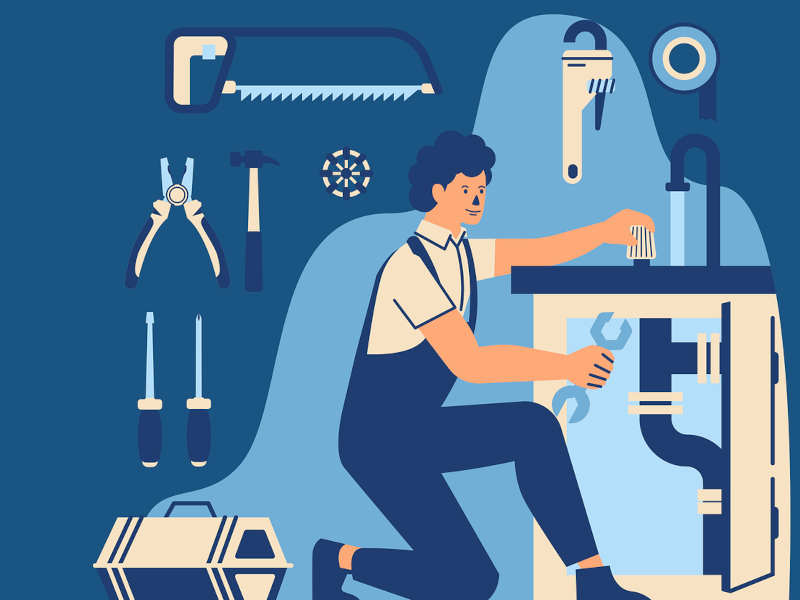Hiring Licensed vs. Unlicensed Home Repair Contractors

5 minutes read time
Introduction
This article explores the critical differences between licensed and unlicensed home repair contractors explaining the benefits of hiring licensed professionals, such as quality work, safety, and legal protection. It also outlines the risks of unlicensed contractors, including poor craftsmanship and financial liability. Learn how to verify licenses, what to look for in a contractor, and common mistakes to avoid. By prioritizing licensed contractors, homeowners can safeguard their investment, ensure safety, and achieve lasting results.
When your home needs repairs, the choice of contractor is critical. A skilled professional ensures your home is safe, functional, and valuable. However, hiring unlicensed contractors can lead to poor-quality work, safety hazards, and costly mistakes. Understanding the differences between licensed and unlicensed contractors will help you make an informed decision that protects your investment and peace of mind.
What is a Licensed Contractor?
A licensed contractor is a professional authorized by your state or country to perform specific types of construction or repair work. To obtain a license, contractors must typically meet education, experience, and testing requirements.
Benefits of Licensed Contractors:
- Insurance Coverage: Licensed contractors carry liability insurance to cover accidents or damages.
- Bonding: This provides financial protection if the contractor fails to meet obligations.
- Professional Standards: Licensed contractors follow codes and regulations that ensure safe, high-quality work.
Types of Licenses:
- General Contractor License: Covers broad construction projects, including home repairs.
- Specialty Licenses: For electricians, plumbers, HVAC technicians, and other specific trades.
Hiring a licensed contractor ensures they are qualified for the job.
Some Potential Benefits of Hiring an Unlicensed Home Repair Contractor
While hiring an unlicensed home repair contractor comes with risks, some homeowners may consider it due to specific potential advantages:
- Lower Costs:
Unlicensed contractors often charge significantly less than licensed professionals. This can make them an attractive option for small-scale projects or homeowners on a tight budget. - Availability:
Licensed contractors are often booked weeks or months in advance, while unlicensed contractors may have more flexible schedules and can start work sooner. - Willingness to Take Small Jobs:
Licensed contractors may prioritize larger, more lucrative projects, whereas unlicensed contractors are often more willing to take on smaller, quick-fix jobs. - Flexibility in Scope of Work:
Unlicensed contractors may offer to do work that crosses multiple trades (e.g., plumbing and electrical) without requiring separate specialists. This can save time and simplify communication. - Informal Agreements:
Some homeowners appreciate the less formal, more personal arrangements with unlicensed contractors, which can sometimes allow for customized solutions or flexible terms.
Important Caveat:
While these potential benefits may appeal to some, it’s critical to weigh them against the risks. Lower costs and convenience could lead to higher long-term expenses if the work needs to be redone or causes damage. Always assess the nature of the project, the contractor’s experience, and whether your budget can accommodate hiring a licensed professional.
Some Potential Risks of Hiring Unlicensed Contractors
Unlicensed contractors might seem appealing due to lower costs, but they carry significant risks:
- Poor Workmanship: Unlicensed contractors often lack the training and expertise needed for quality work.
- Safety Hazards: Shoddy repairs can create safety issues, such as faulty wiring or unstable structures.
- Legal Liability: Homeowners may be held responsible for injuries or damages caused during the project.
- No Recourse: If an unlicensed contractor fails to complete a job or causes damage, you may have limited options for recovery.
Benefits of Hiring a Licensed Contractor
A licensed contractor offers numerous advantages that outweigh the initial cost:
- Quality Assurance: Licensed professionals are more likely to deliver durable, high-quality results.
- Insurance and Bonding: Protect you from financial loss in case of accidents or project failures.
- Experience: Licensing often requires proven expertise, reducing the likelihood of costly errors.
Investing in a licensed contractor pays off by avoiding future repairs, ensuring safety, and preserving your property’s value.
How to Verify a Contractor’s License
Verifying a contractor’s license is straightforward and essential:
- Check Online Databases: Most states have websites where you can search for licensed contractors.
- Contact Local Authorities: Call your local licensing board for confirmation.
- Request Documentation: Ask the contractor to provide proof of their license, insurance, and bonding.
What to Look for in a Licensed Contractor
Hiring someone who communicates well and has a good reputation reduces stress and ensures better results.
When choosing a contractor, keep these qualities in mind:
- Clear Communication: A contractor should explain the project, timeline, and costs transparently.
- Written Estimates: Look for detailed, written quotes outlining the scope of work.
- References and Reviews: Check online reviews or ask for references from past clients.
Common Mistakes Homeowners Make When Hiring Contractors
By taking your time and being thorough, you can find a contractor who fits your needs and budget.
Avoid these pitfalls to make your home repair project a success:
- Skipping Research: Always verify licenses, read reviews, and compare multiple contractors.
- Ignoring Red Flags: Be cautious of contractors who ask for large upfront payments or lack proper credentials.
- Unrealistic Expectations: Understand the project’s timeline and costs to avoid surprises.
Hiring a licensed contractor over an unlicensed one is the smarter choice for home repairs. Licensed contractors bring professionalism, experience, and safety to your project. They provide insurance, bonding, and the assurance that the work will meet legal standards. Protect your home and avoid unnecessary risks by verifying credentials, researching options, and hiring qualified professionals.







